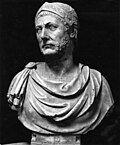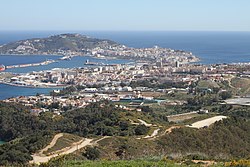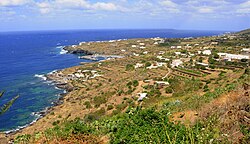characters. The Punic language, also called Phoenicio-Punic or Carthaginian, is an extinct variety of the Phoenician language, a Canaanite language of the Northwest...
68 KB (4,636 words) - 18:33, 15 May 2025
Peninsula, Malta, and Ibiza. Their language, Punic, was a variety of Phoenician, one of the Northwest Semitic languages originating in the Levant. Literary...
57 KB (6,597 words) - 15:12, 26 May 2025
Phoenician to the western Mediterranean, where the distinct Punic language developed. Punic also died out, but it seems to have survived far longer than...
63 KB (6,356 words) - 23:01, 24 May 2025
(including the Punics/Carthaginians), Moabites, Suteans and sometimes the Ugarites and Amorites. The Canaanite languages continued to be spoken languages until...
18 KB (1,914 words) - 06:42, 29 May 2025
The siege of Carthage was the main engagement of the Third Punic War fought between Carthage and Rome. It consisted of the nearly three-year siege of...
34 KB (4,206 words) - 10:01, 30 May 2025
The Third Punic War (149–146 BC) was the third and last of the Punic Wars fought between Carthage and Rome. The war was fought entirely within Carthaginian...
40 KB (5,027 words) - 21:37, 21 May 2025
Phoenician alphabet (redirect from Punic Alphabet)
Ancient Carthage until the 2nd century BC, where it was used to write the Punic language. Its direct descendant scripts include the Aramaic and Samaritan alphabets...
54 KB (4,185 words) - 15:57, 27 May 2025
The Punic religion, Carthaginian religion, or Western Phoenician religion in the western Mediterranean was a direct continuation of the Phoenician variety...
46 KB (5,551 words) - 13:37, 25 May 2025
elements of Pre-Latin (mostly Paleo-Sardinian and, to a much lesser degree, Punic) substratum, as well as a Byzantine Greek, Catalan, Spanish, French, and...
344 KB (40,495 words) - 08:03, 29 April 2025
Carthaginian coinage (redirect from Punic currency)
Carthaginian or Punic coins were produced from the late fifth century BC through 146 BC by ancient Carthage, a Phoenician city-state located near present-day...
57 KB (7,982 words) - 18:25, 25 May 2025
systems of the two. In contrast, the Punic language of Carthaginian settlers was Semitic, while Indo-European languages of the peninsula during the Iron Age...
60 KB (6,529 words) - 00:45, 30 May 2025
from ancient Punic (another Semitic language) instead of Siculo-Arabic, and others claiming it is one of the Berber languages (another language family within...
83 KB (6,072 words) - 22:02, 23 May 2025
Hannibal (category Articles containing Punic-language text)
Hannibal (/ˈhænɪbəl/; Punic: 𐤇𐤍𐤁𐤏𐤋, romanized: Ḥanībaʿl; 247 – between 183 and 181 BC) was a Carthaginian general and statesman who commanded the...
99 KB (12,710 words) - 20:02, 24 May 2025
Phoenician–Punic literature is literature written in Phoenician, the language of the ancient civilization of Phoenicia, or in the Punic language that developed...
22 KB (2,068 words) - 22:56, 25 May 2025
Ancient Carthage (category Articles containing Punic-language text)
Ancient Carthage (/ˈkɑːrθɪdʒ/ KAR-thij; Punic: 𐤒𐤓𐤕𐤟𐤇𐤃𐤔𐤕, lit. 'New City') was an ancient Semitic civilisation based in North Africa. Initially...
199 KB (24,491 words) - 19:51, 25 May 2025
Ceuta (redirect from Languages of Ceuta)
Spanish is the official language, while Darija Arabic is also widely spoken. The name Abyla has been said to have been a Punic name ("Lofty Mountain" or...
75 KB (6,837 words) - 16:10, 28 May 2025
Moloch (category Articles containing Punic-language text)
in spelling to a term that means "sacrifice" in the closely related Punic language. This second position has grown increasingly popular, but it remains...
42 KB (5,283 words) - 15:33, 12 May 2025
or in references in Greek and Roman texts to other languages and the need for interpreters. For Punic, Coptic, and Aramaic or Syriac, a significant amount...
87 KB (10,790 words) - 11:35, 10 May 2025
Málaga (category Articles containing Punic-language text)
2007. Phoenicians from Tyre founded a colony named Malake about 770 BC (Punic: 𐤌𐤋𐤊𐤀, MLKʾ). The town controlled access to the Guadalmedina and served...
96 KB (8,631 words) - 10:48, 27 May 2025
The Second Punic War (218 to 201 BC) was the second of three wars fought between Carthage and Rome, the two main powers of the western Mediterranean in...
69 KB (8,881 words) - 23:10, 27 May 2025
Hanno the Navigator (category Articles containing Punic-language text)
Hanno the Navigator (sometimes "Hannon"; Punic: 𐤇𐤍𐤀, ḤNʾ; Greek: Ἄννων, romanized: Annōn ) was a Carthaginian explorer (sometimes identified as...
25 KB (2,651 words) - 17:44, 26 May 2025
Cagliari (category Articles containing Punic-language text)
pottery Karalitan ship owners and traders, mosaic in Ostia Antica Karaly (Punic: 𐤊𐤓𐤋𐤉, KRLY) was established around the 8th/7th century BC as one of...
97 KB (10,998 words) - 07:51, 31 May 2025
Baal (category Articles containing Punic-language text)
turn derive from the vowel-less Northwest Semitic form BʿL (Phoenician and Punic: 𐤁𐤏𐤋). The word's biblical senses as a Phoenician deity and false gods...
55 KB (5,721 words) - 13:55, 12 May 2025
Pantelleria (category Articles containing Punic-language text)
Venere lake is a soda lake. The Carthaginians knew the island as YRNM (Punic: 𐤉𐤓𐤍𐤌) or ʾYRNM (𐤀𐤉𐤓𐤍𐤌). The Greek geographers recorded it as Kossyra...
28 KB (2,610 words) - 19:03, 1 March 2025
the Punic language than the West-Numidian, and West-Numidian is thought to be more ancient than East-Numidian. Numidian was influenced mostly by Punic and...
25 KB (2,604 words) - 16:42, 19 March 2025
language Celtic languages Celtiberian language Gallaecian language Lusitanian language Punic language Latin language Guanche language Galician-Portuguese...
26 KB (2,211 words) - 09:23, 25 May 2025
The Italic languages form a branch of the Indo-European language family, whose earliest known members were spoken on the Italian Peninsula in the first...
40 KB (4,267 words) - 16:25, 25 May 2025
Mago Barca (category Articles containing Punic-language text)
Mago Barca (Punic: 𐤌𐤂𐤍 𐤁𐤓𐤒, romanized: Magon Barqa; died 202 BC) was a Carthaginian, member of the Barcid family, who played an important role...
13 KB (1,752 words) - 22:17, 5 March 2025
Tangier (category Articles containing Punic-language text)
Tanger-Med port. The Carthaginian name of the city is variously recorded as TNG (Punic: 𐤕𐤍𐤂), TNGʾ (𐤕𐤍𐤂𐤀), TYNGʾ (𐤕𐤉𐤍𐤂𐤀), and TTGʾ (𐤕𐤕𐤂𐤀); these...
97 KB (9,382 words) - 11:12, 30 May 2025
Hispania (category Articles containing Punic-language text)
theory holds it to be of Punic origin, from the Phoenician language of colonizing Carthage. Specifically, it may derive from a Punic cognate ʾī šāpān (𐤀𐤉...
45 KB (5,264 words) - 11:19, 11 May 2025























